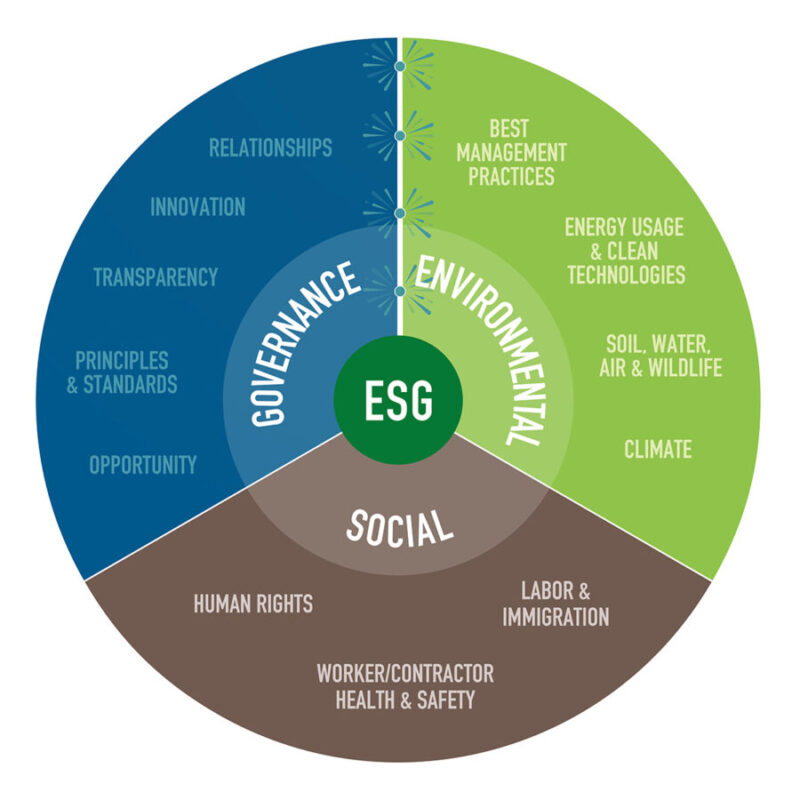
• Introduction
Did you know that ESG-focused assets could exceed $53 trillion globally by 2025, representing more than one-third of total assets under management? As the world accelerates toward sustainability, Saudi Arabia is charting its own ambitious path in the Environmental, Social, and Governance (ESG) landscape.
With Vision 2030 as its north star, the Kingdom is not just adapting to ESG standards—it is leading transformative initiatives that align economic diversification with responsible business practices. From the Saudi Green Initiative to ESG disclosures mandated by Tadawul, a new chapter of corporate governance is unfolding.
This blog explores Saudi Arabia’s ESG journey, highlighting key developments, future predictions, and what it all means for businesses navigating compliance and sustainability expectations.
• What is ESG? A Simple Breakdown
ESG stands for Environmental, Social, and Governance—a set of standards that guide how companies operate in a socially responsible and sustainable way. Here’s a quick overview:
- Environmental (E): Focuses on how a company impacts the planet, including carbon emissions, resource usage, and waste management.
- Social (S): Deals with human rights, labor practices, diversity, equity, and community engagement.
- Governance (G): Encompasses leadership, ethics, compliance, transparency, and stakeholder rights.
Globally, ESG has moved from being a buzzword to a business imperative. In Saudi Arabia, this transformation is happening rapidly, driven by regulatory reforms and a broader national agenda for sustainability.
• Why ESG Matters for Saudi Businesses
- Alignment with Vision 2030
Saudi Arabia’s Vision 2030 aims to reduce dependence on oil, diversify the economy, and promote a sustainable future. ESG adoption plays a crucial role in achieving these goals, especially as the country attracts global investors who demand transparency and sustainability.
- Regulatory Momentum
In 2021, Tadawul, Saudi Arabia’s stock exchange, introduced ESG disclosure guidelines. These guidelines encourage listed companies to report on sustainability metrics across E, S, and G pillars. The Capital Market Authority (CMA) and the Ministry of Investment are also advocating for ESG integration.
- Investor and Consumer Expectations
Today’s investors prioritize companies with strong ESG credentials. Similarly, Saudi consumers—especially millennials and Gen Z—are aligning their purchasing decisions with social and environmental values.
• Key Challenges Facing ESG Adoption in Saudi Arabia
- Lack of Standardized Frameworks
Many companies struggle to navigate ESG due to fragmented reporting standards. Without a unified framework, businesses often face confusion and inefficiencies in compliance.
- Data Collection and Transparency
Collecting reliable ESG data remains a major hurdle. Companies lack the tools and expertise to accurately measure and report on their ESG performance.
- Skill Gaps
ESG requires specialized knowledge in sustainability, governance, and compliance. There’s a growing need for upskilling professionals to drive ESG initiatives from within.
- Short-Term Business Pressures
Many organizations focus on quarterly results and immediate profitability, which can conflict with the long-term investments ESG strategies require.
• Solutions and Best Practices for ESG Success
- Adopt Global ESG Frameworks Locally
Businesses should align their reporting with globally recognized frameworks such as:
- GRI (Global Reporting Initiative)
- SASB (Sustainability Accounting Standards Board)
- TCFD (Task Force on Climate-related Financial Disclosures)
These frameworks can be adapted to fit the Saudi regulatory landscape while ensuring credibility.
- Leverage Technology and GRC Software
Advanced Governance, Risk, and Compliance (GRC) software solutions like CGBOD can help automate ESG tracking, streamline reporting, and ensure regulatory alignment.
- Train and Upskill ESG Leaders
Organizations should invest in ESG training programs for their compliance teams, executives, and board members to ensure informed decision-making.
- Engage Stakeholders Proactively
Transparent communication with investors, customers, and regulators builds trust. Regular ESG updates via sustainability reports and online dashboards can enhance reputation and compliance.
• Real-World Examples: ESG in Action
- Aramco
The Saudi oil giant is actively incorporating ESG metrics into its operations. It has committed to net-zero emissions by 2050 and continues to invest in renewable energy and sustainability research.
- Saudi Electricity Company (SEC)
SEC has implemented robust ESG practices, including solar power projects, community welfare initiatives, and corporate governance enhancements.
- NEOM
The $500 billion smart city project exemplifies the Kingdom’s commitment to ESG, from zero-carbon urban planning to community well-being and governance transparency.
• What’s Next? Future of ESG in Saudi Arabia
- Mandatory ESG Disclosures
We anticipate ESG reporting will soon become mandatory for all publicly listed companies, possibly extending to private entities as part of broader regulatory reform.
- Rise of Green Finance
The Saudi financial sector is exploring green bonds and sustainability-linked loans, offering new opportunities for ESG-aligned investment.
- AI & ESG Analytics
Artificial intelligence will play a major role in tracking and predicting ESG performance, especially in environmental monitoring and risk management.
- Increased Public-Private Collaboration
Expect more joint initiatives between government bodies and corporations to standardize ESG practices across sectors.
• Conclusion: Embrace the ESG Shift Today
Saudi Arabia’s ESG journey is a reflection of its broader transformation towards a sustainable and diversified economy. For business leaders, compliance officers, and governance professionals, the message is clear: ESG is not optional—it’s a strategic priority.
By aligning with best practices, leveraging technology like CGBOD, and fostering a culture of transparency, Saudi companies can lead this transition successfully.
